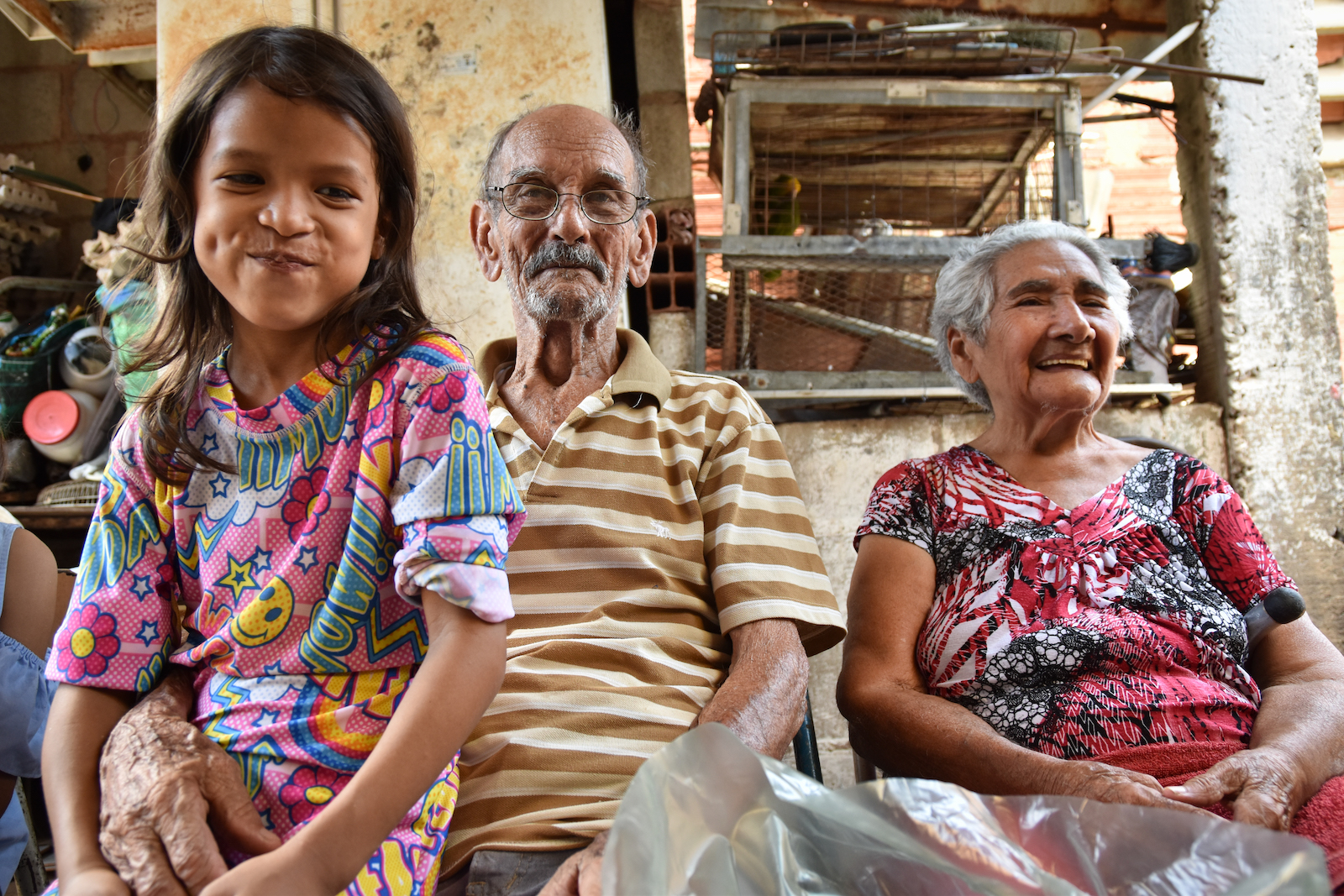“They are asking for you!” Maria, a community leader from Zulia, Venezuela tells me as soon as we arrive. We’ve come to distribute food to vulnerable friends.
I scan the place trying to guess who might be looking for me. Mr. Manuel with his cane? Zulay with her two small children? Mrs. Maritza, who although she can no longer hear very well, still speaks loud and clear? They are my friends in the community, who have opened their doors in the past, and now they all start waving to say hello.
“Since we arrived, she keeps asking about you,” Maria continues.
“But who?” I ask with curiosity.
“Well, Mrs. Aracne of course.” At that very moment, I see the figure of a 75-year-old woman staring at me, and I immediately run out to greet her.
Too Many Struggles for Venezuela’s elderly
This friend’s story is full of struggles, just like all our friends in Venezuela. She’s married to Manuel, 5 years younger than her, and has lived in this community for more than 40 years.
“I finished raising him,” Mrs. Aracne told me, laughing about their age difference, the first time I visited them.
Their home is full, as she and her husband have welcomed her older brother, almost 80 years old (who has trouble walking and talking after an accident), and a 14-year-old book-loving granddaughter, who lost her parents when she was little. Aracne and Manuel are raising her now.
“We haven’t eaten today. That’s why I’ve been up since early, cleaning. If I keep busy, I don’t remember I’m hungry,” she told me. Her only source of income is her two sons who live in Colombia and send her money from time to time.
When Extreme Poverty is Normalized
In this part of Venezuela, extreme poverty has become normal over the past decade. Ninety-six percent of households here are living in poverty, and lockdowns triggered by Covid-19 have only made the situation worse. As of a few months ago, it took 116 monthly minimum wages to buy enough food for a family to eat regular meals for a month. Mrs. Aracne’s sons certainly don’t have that kind of money to spare.
The situation is particularly dire for the elderly. They worked hard their entire lives to save for when they knew they would be too frail to work. The economic crisis and ongoing currency collapse wiped out their savings—quite literally making their savings worth pennies. Many of their able-bodied children have fled to other countries in hopes of earning a living, leaving behind young children to be cared for by their grandparents—grandparents who aren’t always able to feed themselves.

“Do you remember my name?” she said when I approached her on the day of the food distribution.
“Mrs. Aracne, I might forget my own name, but never yours,” I replied as I gave her a hug.
“When you visited us, we were really happy because we felt listened to. Thank you very much for the food, for the medicines, for everything,” Mrs. Aracne’s voice cracked when I gave her her food pack. In this community, we’re growing deeper ties with families we meet at our regular medical clinics. So many of the patients who come suffer from malnutrition; especially the children. As for older patients with chronic illnesses, we need their prescriptions to work—and nutrition helps.
Giving Food and Friendship
It’s heavy, the food pack we give to Mrs. Aracne, with two weeks worth of groceries. Corn and wheat flour, butter and sugar, rice and oil, canned fish and pasta, coffee and powdered milk. And it’s all shelf-stable—many of our friends in this community don’t have refrigerators.
Like Mrs. Aracne, there are dozens of families in this community we have friendships with now. We support them not only because that is our work, but because we know them. We spend time in their homes, we listen to their stories, and in the midst of the current crisis, we want them to know that they can count on us. When the most vulnerable in communities have their needs met (including Mrs. Aracne’s neighbors), violence is less likely to come to their homes.
Our medical clinics in Venezuela meet health needs. Food baskets meet hunger needs. Listening–building relationships where every voice is valued, where everyone gives and everyone receives–this is the vital work that pushes back the desperation that can lead to violence.


